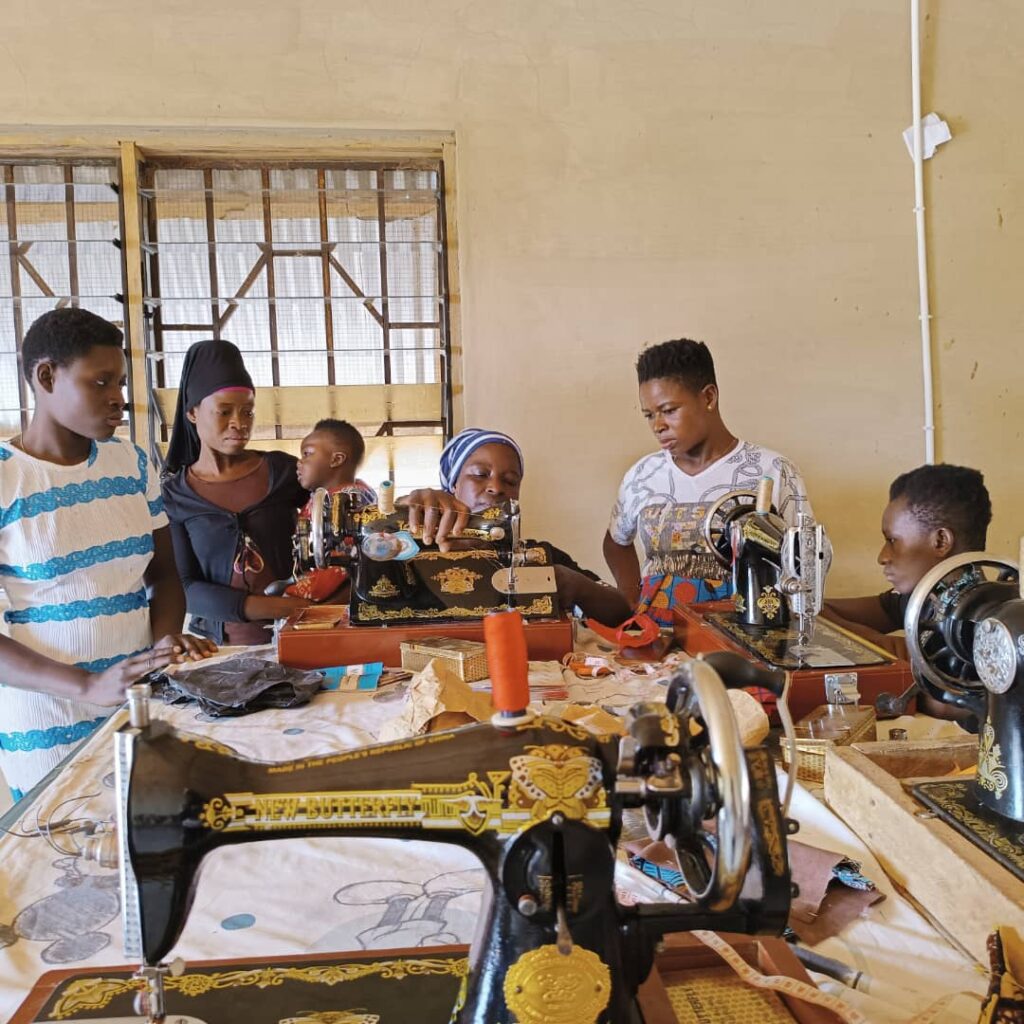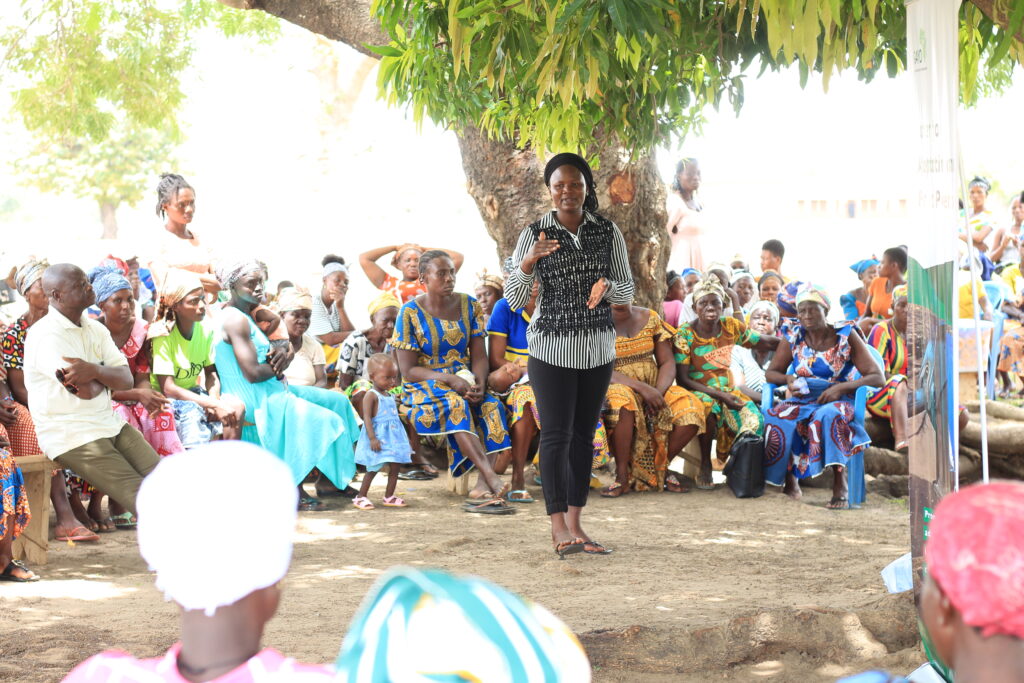Location & Region: Upper East Region, Ghana (Kassena Nankana West and East districts)
Partner: GAYO
Implementer: Springlove, Climate Action Africa, Canadian government
Impact Systems: Water, Food security
Impact/Beneficiaries: Kassena Nankana: 5,000 people with access to clean water; 2,165 students and community members reached with menstrual hygiene education, reducing absenteeism by 70%; 75 youth leaders trained in climate-smart techniques; 30% increase in farming yields for local families; 20 women trained in alternative livelihood skills.
The Green Africa Youth Organization (GAYO) joined the Race to Resilience in 2023, as the first youth-led partner initiative, focusing on increasing the resilience of young people across Africa and beyond.
–
In the Kassena Nankana districts of Ghana’s Upper East Region, the land tells the story of a community battling climate extremes. Parched earth cracks underfoot during extended droughts, while sudden bursts of unpredictable rainfall fail to nourish the struggling crops. Climate change continues to threaten the stability of the region, where erratic weather patterns and water scarcity make farming unreliable. These conditions disproportionately affect women and children, leading to widespread malnutrition and deepening gender inequality. Period poverty further exacerbates this inequality, preventing girls from accessing education and fully participating in society.
Amidst these challenges, hope is taking root. The “Water for Adaptation and Period Poverty” (W4APP) project, operating in the Kassena Nankana West and East districts, is helping improve access to water, food security, and education. The project focuses on sustainable water access, menstrual hygiene education, youth leadership development, and alternative livelihood training – laying a path for greater resilience in the face of climate change.
Led by Race to Resilience partner GAYO and supported by Springlove, the installation of mechanized wells in the Kandiga community has provided reliable water sources for domestic use and irrigation. This intervention has extended the planting season from three to five months, increasing agricultural productivity by 30%. With access to water for crop cultivation even during the dry season, farmers are no longer solely dependent on unpredictable rainfall. As a result, malnutrition is being tackled, and communities have a better chance of escaping poverty through improved food security.
The project also addresses the critical issue of period poverty, which has silently held girls back from reaching their full potential. Without access to basic menstrual hygiene products, many girls are forced to miss school, affecting their education and long-term opportunities. The W4APP initiative has established an Adaptation Resource Centre where out-of-school girls are trained to produce reusable sanitary pads – an affordable, environmentally friendly solution that has already benefited over 2,165 people. The project also uses community sensitization campaigns through social media and radio programmes, reaching over 65,000 people to break down taboos surrounding menstruation and ensure girls remain in school.
 Empowering young people is another key aspect of the W4APP project. In collaboration with Climate Action Africa and the Canadian government, 75 youth – 80% of them female – have been trained in climate-smart farming techniques such as zai pits, half-moons, and stone lines. These methods help retain water and restore soil fertility, crucial for sustaining agriculture in drought-prone areas. In addition to agricultural skills, the youth have also been equipped with essential knowledge in menstrual health, water conservation, and home water filtration. These young leaders are now driving change in their communities, helping to address environmental and social challenges.
Empowering young people is another key aspect of the W4APP project. In collaboration with Climate Action Africa and the Canadian government, 75 youth – 80% of them female – have been trained in climate-smart farming techniques such as zai pits, half-moons, and stone lines. These methods help retain water and restore soil fertility, crucial for sustaining agriculture in drought-prone areas. In addition to agricultural skills, the youth have also been equipped with essential knowledge in menstrual health, water conservation, and home water filtration. These young leaders are now driving change in their communities, helping to address environmental and social challenges.
To further build resilience, the project offers skills development programmes that help women and youth diversify their incomes. Training in trades such as liquid soap making, sewing, and other crafts has already empowered 20 women, many of whom are now generating additional income to support their families. This diversification reduces dependency on climate-vulnerable farming and gives women greater control over their economic futures.
 The W4APP project has already made a significant impact on the region. Over 5,000 people now have access to clean water, leading to improved health outcomes and reduced healthcare costs due to fewer waterborne diseases. Additionally, menstrual hygiene education has drastically reduced absenteeism among girls in partner schools by 70%, enabling more young women to stay in school and pursue their potential. The project’s youth leadership programmes are empowering a new generation of climate leaders, while the skills development initiatives are helping women gain economic independence.
The W4APP project has already made a significant impact on the region. Over 5,000 people now have access to clean water, leading to improved health outcomes and reduced healthcare costs due to fewer waterborne diseases. Additionally, menstrual hygiene education has drastically reduced absenteeism among girls in partner schools by 70%, enabling more young women to stay in school and pursue their potential. The project’s youth leadership programmes are empowering a new generation of climate leaders, while the skills development initiatives are helping women gain economic independence.
At its heart, the W4APP project is about gender equality and youth empowerment. By focusing on these groups, the project is nurturing the next generation of climate leaders. It equips youth with practical skills in water management and climate-smart farming while ensuring that girls and women are not left behind in the fight against climate change. By addressing period poverty and promoting menstrual hygiene education, the project removes barriers to education, enabling girls to stay in school and succeed. Women and youth are now leading climate adaptation efforts in their communities, becoming essential drivers of sustainable change.
About Race to Resilience
The Race to Resilience is a global campaign led by the UN Climate Change High-Level Champions, aiming to build the resilience of 4 billion people from vulnerable communities by 2030. The campaign focuses on mobilizing actions that protect people, ecosystems, and economies from the impacts of climate change. Through a network of partners and local initiatives, Race to Resilience amplifies grassroots efforts, drives systemic change, and promotes scalable solutions that strengthen communities’ ability to thrive despite climate risks.
